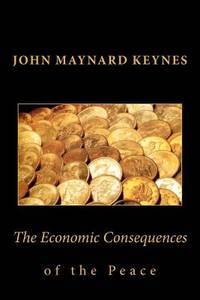
John Maynard Keynes: The Economic Consequences of the Peace Paperback - 2010
by Keynes, John Maynard
From the publisher
"The Economic Consequences of the Peace" gave economist John Maynard Keynes a huge but controversial influence on perceptions of the peace treaty signed after World War I. John Maynard Keynes was not only a brilliant economist, but a superb writer with a keen eye for the foibles of the great men of his time. "The Economic Consequences of the Peace" is a must read for anyone interested in the Versailles Peace Treaty and the aftermath of its signing. Even today, the power of Keynes' argument is evident. Though Keynes admitted that the allies might not hold Germany to all the economic terms of the treaty, he still felt strongly that many of the terms of the treaty, whether enforced or not, discouraged sound planning by German investors, companies, and its government, and unnecessarily impoverished the German people. As pointed out in his classic book, Keynes felt this was bad for not just Germany, but all of Europe.
Details
- Title John Maynard Keynes: The Economic Consequences of the Peace
- Author Keynes, John Maynard
- Binding Paperback
- Pages 154
- Language ENG
- Publisher CreateSpace Independent Publishing Platform
- Date 2010-05
- ISBN 9781452878478
About the author
Remote Content Loading...
Hang on… we’re fetching the requested page.
Book Conditions Explained
Biblio’s Book Conditions
-
As NewThe book is pristine and free of any defects, in the same condition as when it was first newly published.
-
Fine (F)A book in fine condition exhibits no flaws. A fine condition book closely approaches As New condition, but may lack the crispness of an uncirculated, unopened volume.
-
Near Fine (NrFine or NF)Almost perfect, but not quite fine. Any defect outside of shelf-wear should be noted.
-
Very Good (VG)A used book that does show some small signs of wear - but no tears - on either binding or paper. Very good items should not have writing or highlighting.
-
Good (G or Gd.)The average used and worn book that has all pages or leaves present. ‘Good’ items often include writing and highlighting and may be ex-library. Any defects should be noted. The oft-repeated aphorism in the book collecting world is “good isn’t very good.”
-
FairIt is best to assume that a “fair” book is in rough shape but still readable.
-
Poor (P)A book with significant wear and faults. A poor condition book can still make a good reading copy but is generally not collectible unless the item is very scarce. Any missing pages must be specifically noted.